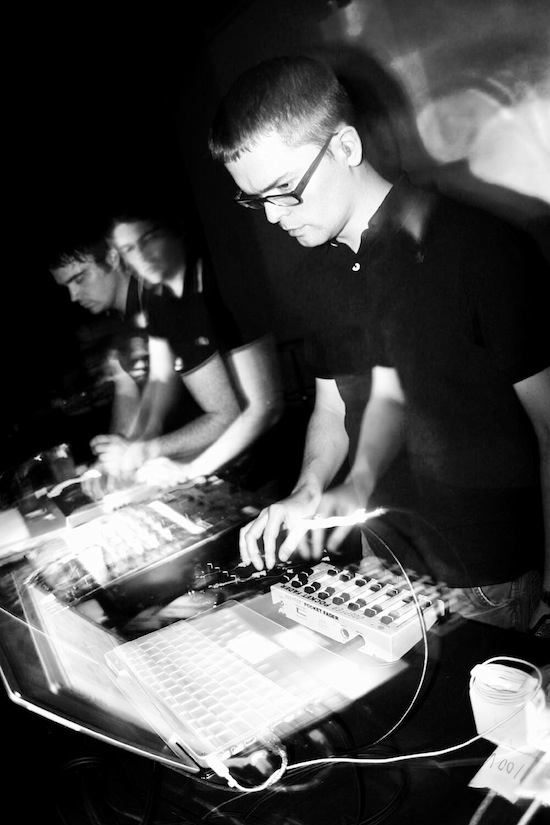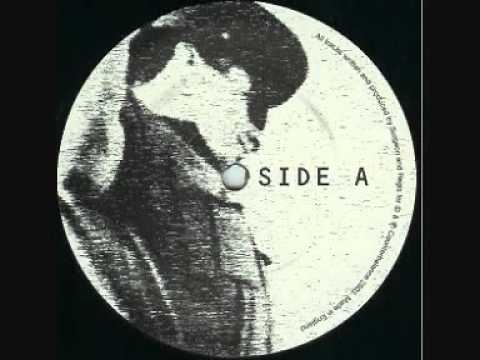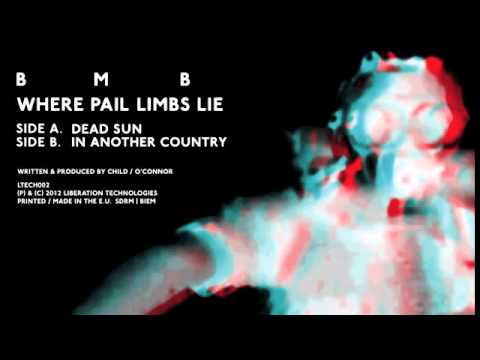British Murder Boys started with a 12" that has one of my favourite sleeves of all time. A grainy image of a man bent double over what might be a gymnastics pommel horse, another chap in a military uniform raising his arm to administer a slap, at once unpleasant or suggesting a pretty intriguing evening down your favoured local S&M establishment and arguably a wind-up, whichever way you look at it. Within the black vinyl grooves of ‘Learn Your Lesson’ lay a rumbling and rolling buttock-paddlin’ mixture of post-punk, techno, housey synths, furtive muttering and, at the end, gasps and moans. On the flip there was ‘Rule By Law’, a hard, rattling prang in a girder works.
British Murder Boys ended onstage in Tokyo last year, with clouds of dry ice concealing mysterious figures in sinister Catholic robes and Tony Surgeon (who normally looks as if he treats his music with the the same calculated precision and control that a man with ‘special soft ropes’ might his craft), screaming at the audience with clenched fists as Regis thwacked away on a rack tom. The strange, short career (seven 12"s, including this year’s Live In Tokyo) was a brilliant, cheeky undermining of techno trainspotter spod seriousness, melding sloganeering track titles, riotous live performances and a very British aesthetic. British Murder Boys were some unhealthy combination of Peter Cook and Dudley Moore, Whitehouse and a leading figure of industry snapped in the tabloids with his pants down and a satsuma in his mouth. They sign up to the great traditions of (to borrow from Coil a little) the ritual accumulation of sexual energy, rock & roll, black humour, provocation, angst music for sex people, not taking yourselves too seriously while taking things very seriously indeed, extreme noise and just having a rare old hoot while doing it all.
After that final performance (described by Regis as a "night of wrongness" when we spoke to him earlier this year) British Murder Boys are no more. May they rest in perversion. Ahead of their DJ sets as Regis and Surgeon at Bloc in London this weekend, we spoke to Karl O’Connor and Tony Surgeon about the rise and fall of these national fucking treasures.
Why did you decide to form BMB? What was the eureka moment?
Tony Surgeon: I can’t actually remember, I think it was a fantasy that built up over time. Some kind of alternate universe space rock act that we fantasised about being. Of course Karl and I had worked together for a long time before BMB, but that kind of solidified it.
Was it you both trying to be, if not rock stars, then Douglas McCarthy, Nick Cave, putting some personality into it?
TS: I love the way artists like David Bowie play with different characters in their music, so perhaps it’s influenced by that idea too.
Karl O’Connor: Yeah, Angie Bowie, I wanted to be Angie Bowie. I think I always had Gene Vincent in my mind, but not the young Gene, the Gene on the 1970s comeback tour, the one where he had to play all the crap venues and had to beg for the bread afterwards, but still be a star, albeit from a different era… he still wore his leathers and he filled the small function rooms and half empty halls with his charisma; pure star quality. I always thought of that when we played a barn dance in the middle of nowhere, if Gene did it, so could I. ‘Barn dance’: Birmingham speak for a night that is not well attended, in venues that should have been shut down decades ago and promoted by people who only liked your early stuff.
In an old interview Karl said that the name British Murder Boys was "a big dumb name in the best traditions of British pop music". Did you see it as a pop band?
TS: I imagined a music awards show, like the Brit Awards or something like that. Every year BMB would win the category for Britain’s Best Loved Absurdist Space Rock Duo. I can see it all, every detail, the announcement, the acceptance speech. We won it every year.
Has some of BMB been thanks to a frustration with the techno world? Do you both continue to find yourselves frustrated by techno?
TS: Karl and I have never fitted comfortably in the techno scene. It frequently holds itself up to be experimental and boundary-pushing when in reality it’s ultra conservative. Totally vanilla. It’s like people have a box with the whole of creation inside it and they just look at the picture on the box instead of looking at what’s inside. Looking at a reflection and being seduced by that.
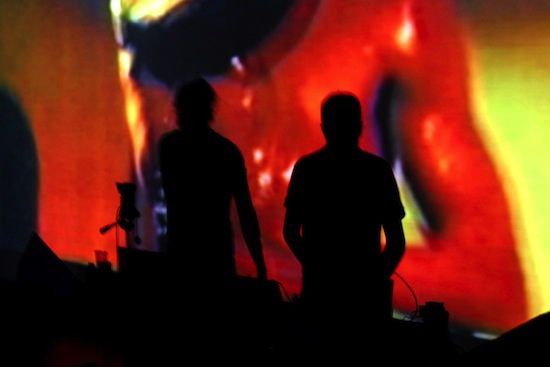
Karl said in e-mail that you’d been keen to bring in ‘panto’ to the final performance. Has humour always been an important part of British Murder Boys?
TS: The history of British pantomime is a big influence for me. The way that it incorporates archetypes, drag and misdirection. As for the humour? Well, if you have to spell out a joke, it’s not funny anymore.
KO: Danny La Rue times two.
What are the musical things you both agree on? And what do you disagree on?
TS: I’ll just say that Karl gets really angry about my use of subliminal flute sounds in BMB tracks. He usually spots them before it’s too late, but not always!
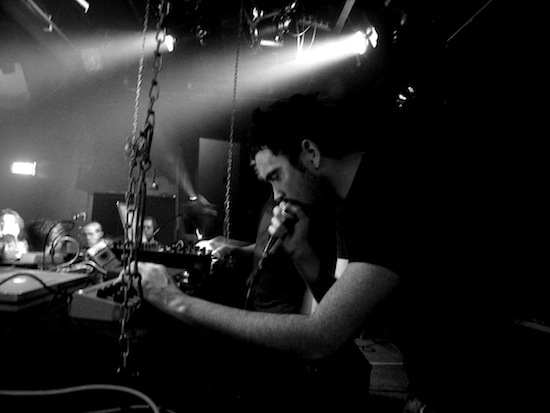
Photo by Doris Woo
What were your non-musical inspirations?
TS: Absolutely everything, the whole of everything I’ve ever experienced. I could be in Kwik Save, queuing behind a wino and I imagine what he’s thinking about, what’s in his head and then I go home and channel that into a track.
KO: Apart from flutes.
How much of an influence was Birmingham on British Murder Boys?
TS: If you ever put anything nice in Birmingham, then people always burn it down and puke in it on the first night it’s there, so yes, it’s an influence.
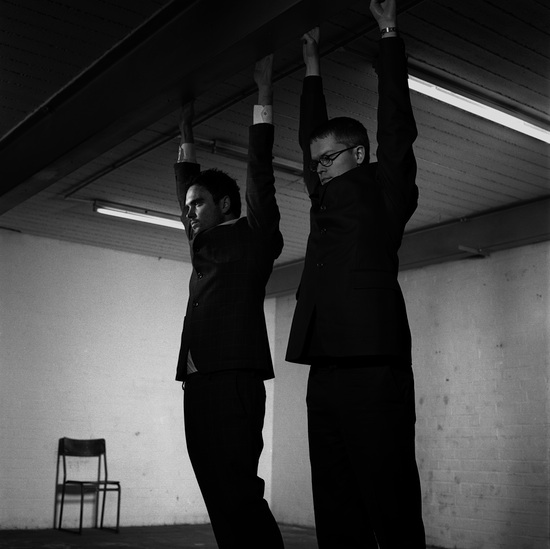
Photo by Brian Griffin
KO: I remember when the wonderful Brian Griffin was taking our photo for some failed bid that the city council was making for some culture nonsense to be held in Birmingham. Brian is great and from the same town as me in the Black Country; we all knew it was pointless but we made the best of it. I think the point is, that even though he took some of the most iconic rock/pop photos of the 80s, he was still there, on a wet Monday afternoon in Digbeth trying to turn shit into gold, which he did. That’s what it’s all about for BMB.
What does the British bit of your name mean to you? How did Britishness factor into the aesthetic/your intentions?
TS: Very much so like I said, I always fantasised about us being ‘Britain’s best loved absurdist space rock duo’.
KO: British Leyland, British Home Stores, British Steel, Tommy Steel; all the former greats.
What’s the most you’ve pissed each other off?
KO: That flute thing.
I love the Learn Your Lesson artwork. It’s right sexy, and amuses at the same time. Can you tell us about it?
KO: Is that the one with that bloke dressed up as a soldier slapping that other bloke’s arse who’s bent over a vaulting horse? It’s something to do with the Duke of Edinburgh’s Award scheme, I think.
Did people ever think British Murder Boys was some kind of hardcore gay act? To my mind the aesthetic, the titles, the wrestling, the, err, rather gristly, lube-y, chewy sound makes me think that, but perhaps I am just a pervert.
KO: Yes they did and yes you are.
How did you used to put British Murder Boys tracks together? Were you in the same place? What gear did you use? People love a gear question.
KO: At each session we recorded and built all our tracks from scratch. We had limited time as we didn’t live in the same country, so it was intensive recording when we got together, very disciplined actually. We basically processed lots of stuff, ran synth sequences through amps. We also used lots of contact mics to get percussion and I used play the cornet through Tony’s Eventide, which seemed to have a special setting that made everything sound like a fucking flute. Finally everything went through the desk to tape on the Revox PR99 MKII.
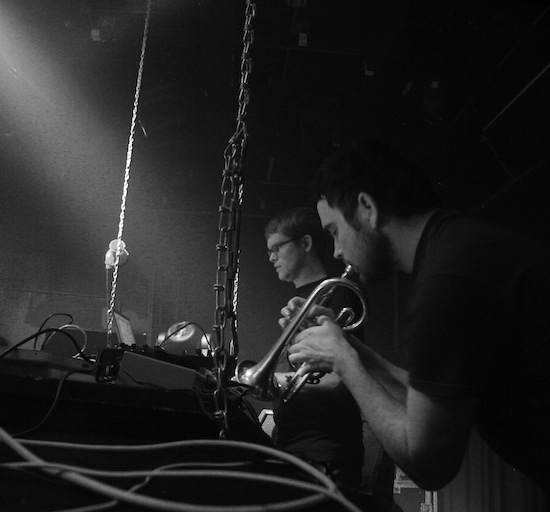
Photo by Doris Woo
Why did you decide that British Murder Boys had to end?
KO: Did it the right way – we came back and then we tied up the loose ends. We did the final 12" for Lib Tech [2012’s ‘Where Pail Limbs Lie’] which was a really great thing as it got us working together again. The final show in Tokyo was the one where we actually pulled off what we always said we were going to do and put on a real show, not just a regular club gig where we play techno at people (our tour manager there also looks after Saxon, which says it all really). I’m glad it was filmed and I’m glad the final edit captures the tension between us. We just couldn’t do it again because it was a one-time thing… we made it end.
On Saturday you’re both playing together in London. What can we expect?
KO: You know, the usual, play some techno at people. The weird thing is I don’t think Tony or myself have played on the same bill as Surgeon and Regis for about 15 years – this will be the first of many in the coming year. I’ll be warming up for Tony, business as usual.
Regis and Surgeon play Bloc in Hackney Wick, London on Saturday, December 6; head here for full details and tickets

